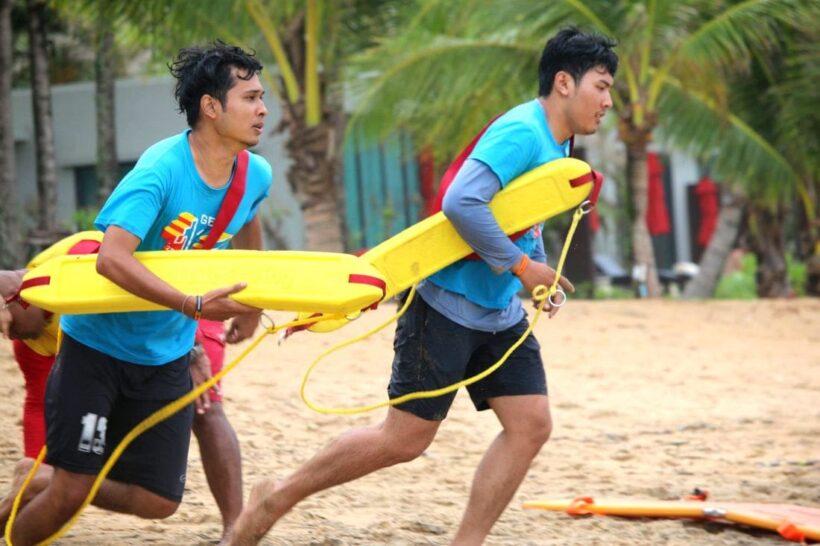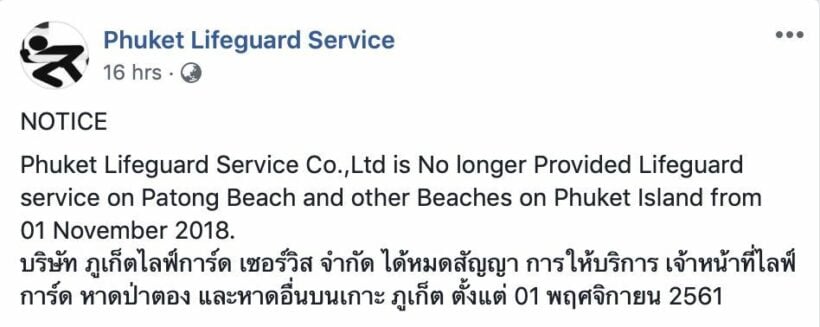9 years of providing Phuket’s lifeguards comes to an end

PHOTO: Constant training and up-skilling was at the core of the Phuket Lifeguard Service
The nine year relationship between the Phuket Lifeguard Service and the Phuket provincial and Thesaban
administrators is over.
The contract for providing professional lifesavers at Patong beach, the final beach under their watchful eye, finished yesterday.

Speaking to the MD of the Phuket Lifeguard Service Company, Vitanya Chuayuan, today The Thaiger noted a tone of resignation in her voice after the long battle the company had to provide skilled and professional lifeguards along Phuket’s beaches.
Phuket’s outgoing governor, who finished his tenure on the island on September 30, Norraphat Plodthong passed the baton of issuing contracts to lifeguards services from the island’s central Provincial government down to the local Thesabans. Each local municipality would handle their own contracting for patrolling their local beaches.
The new tenders have resulted in two years of turmoil along the west coast beaches with a hotch-potch of volunteers, paid life-savers, trained, untrained and ‘locals’ putting on the traditional red and yellow outfits to patrol Phuket’s beaches.
The results, as logged in story after story about drownings on The Thaiger and other local news sites, are evidence of the failure of the new system to provide an adequate or professional level of international-standard lifeguarding in Phuket.
All this whilst the numbers of tourist arrivals, especially during the traditional wet-season, keeps increasing, year on year.
Vitanya says that it was a sad day indeed as the company, which had worked so hard to improve the standards of lifesaving on the island for so long, had to now watch from the sidelines as the quality of lifeguards, and the entire system of island-wide beach patrols, descends into bureaucratic turmoil.
“I have not spoken to Phuket’s new Governor at length about the matter, but the old governor believed that giving the money to the Thesabans, and letting them control the provision of services, would be a better solution.”
“The budgets just kept dropping each year and, although we tried to improve our efficiencies whilst improving the quality of our lifeguards, we just couldn’t match the lower tenders for the contracts anymore.”
“We also believe that a single company, providing lifeguarding across all beaches in Phuket, was a much better system amortising costs of equipment, training and sharing of local knowledge across the island.”
Phuket Lifeguard Service was instrumental in asking the provincial officials to assist with coming up with information pamphlets and signage to present to tourists, especially Chinese tourists, to alert them of the dangers of swimming along Phuket’s west coast beaches, particularly during the south-west monsoon season.
“There were many brochures printed. We handed many out to tourists on the beach (they were multi-lingual) but we really needed them to be distributed at the airport and hotels as a priority. We’re not sure if that happened or how many were distributed.”
After 9 years of years of reducing the number of drownings on Phuket’s beaches, despite the number of tourists rising every year, Vitanya says it has been sad to see the number of preventable drownings increase since the Provincial government started the new system.
“We believe it should all be controlled by the one professional company or organisation to provide lifeguard services. This way we could make savings across the board with training, equipment and co-ordination with all emergency services.
Daren Jenner, the Marine Safety Officer for the International Surf Lifesaving Association (ISLA), says that ISLA has been constantly monitoring the situation with the Patong lifeguard team.
“During ISLA’s beach audits earlier this year, the Patong team was the only one on the island to meet ISLA’s international standards. ISLA was urging the Thai government at all levels to support a unified, professional lifeguard force for all of Phuket and the surrounding islands.”
“Phuket is a world-famous beach and water-sport destination but surrounded by potentially dangerous waters, yet the lifeguard service has repeatedly failed to receive adequate support.”
Speaking specifically about the problem with the Chinese tourists and the many drownings in recent years Vitanya said, “We provided flags with warnings in Chinese, English, Russian and Thai. The Thesaban are still using our old flags which haven’t been updated for a few years – they are very tatty now and hard to read. The flags should be changed every six months.”
“Many Chinese people are not well educated in water safety. It’s not really their fault and more needed to be down to provide information before they arrived at the beach. Once on the beach it was just a huge communication problem that sometimes ended up in disaster.”
For now Vitanya says her company will keep providing professional lifeguards to the hotels and water parks.
“At our biggest we had around 100 active lifeguards, all men. Asian women don’t really like swimming and are not really interested in lifeguard work. Now we have only five instructors and a few freelance staff.
“We are sending two of our lifeguards to the Life Saving World Championships in Adelaide from November 19-26 at Glenelg Beach. Our team has developed such skills and talent here on the island. It’s sad to see it all go to waste.”

Phuket Lifeguard Service were training the new generation of Phuket lifeguards
Latest Thailand News
Follow The Thaiger on Google News:


























